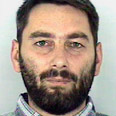
Aleksander Cvetkovic - May God help me
Massacre suspect: Soldiers murdered then went to coffee shop
Aleksander Cvetkovic had already been interrogated in 2005 by Hague court over involvement in Srebrenica massacre. Transcripts obtained by Ynet reveal parts of interrogation in which he claims he was only a driver
Aleksander Cvetkovic, the Israeli man arrested over his suspected involvement in a massacre in Bosnia, was interrogated by the International Court of Justice at The Hague as early as October 2005, where he told interrogators everything he knew about the Srebrenica massacre in which it is suspected he had an active role.
Investigation transcripts that Ynet obtained show that among other things, he reconstructed events following the massacre in which more than 1,000 Muslims were murdered, and stated that the soldiers then went to relax in a coffee shop.
Cvetković, 43, immigrated to Israel in 2006 and lives in Carmiel with his wife and children. He was arrested following an extradition request from Bosnia, and his remand was extended by one month.
During his interrogation five years ago, Cvetkovic denied that he was directly involved in the massacre and claimed that he served as a driver. Early into the interrogation investigators told him that he was a suspect, but made it clear: "You aren't our target in this investigation, we just want to get details about events that occurred during the war."
Among other things, he was confronted with the testimony of another soldier who claimed that it was Cvetkovic who came up with the idea to use a machine gun to speed up the executions. "I don't know how to even respond to that," Cvetkovic said to his interrogators, "that is absolute nonsense. He's insane. I didn't even see his machine gun."

Aleksander Cvetkovic in court (Photo: Ohad Zwigenberg)
When asked if he had seen the executions being carried out or saw the bodies he answered: "I just saw one execution, partially. I can't say how many I saw. In a certain place there were 20 or 30 bodies and in another place there were more. After the murder the soldiers got into their vehicles and drove off. I drove after them in my vehicle. We stopped after two kilometers at a coffee shop."
God help me
"I didn't see anything like what you are claiming was done in the war," said the suspect, "my unit didn't see any combat action and I was away from my unit for a few months." At the end of the interrogation Cvetkovic said: "I can say that I blame and curse the day I decided to join those soldiers. I'm happy in my life; I have a nice wife and kids."
Cvetkovic sought to minimize his role in the massacre and said that he was a driver who took soldiers from various units to the place where the executions took place. "People were taken off a bus to the river," he recalls, "we could hear the shooting and when the soldiers came back they said 'that's how it should be done.'"
Cvetkovic described one incident in which one of the soldiers who was with him in the vehicle, and who he referred to as 'crazy', shot the arm of one man and told him to run. The same soldier then followed him and shot him in his other arm, then he shot him in one leg and then the next, screamed at him to run and then shot him.
"When the soldier came back I asked him 'are you normal? Why did you do that?'" Cvetkovic said. "He answered 'that's none of your business, you want to join them?'".
Investigators asked him if he knew what happened to the prisoners he had seen, he answered: "I assumed that they killed them all. If they killed the one person I saw on the front, I can imagine they killed the rest of the prisoners."
"I saw a bus arriving with 50 passengers, some in uniform, some in civilian clothing, some young, some old", Cvetkovic noted. "Everybody's hands were tied and some had blindfolds. I could see the eyes of some of them. Afterwards I saw more buses bringing prisoners. I heard gunshots after the prisoners were taken away. I know the truth is the only way I can protect myself and may God help me."
Omri Efraim contributed to the report
- Follow Ynetnews on Facebook










